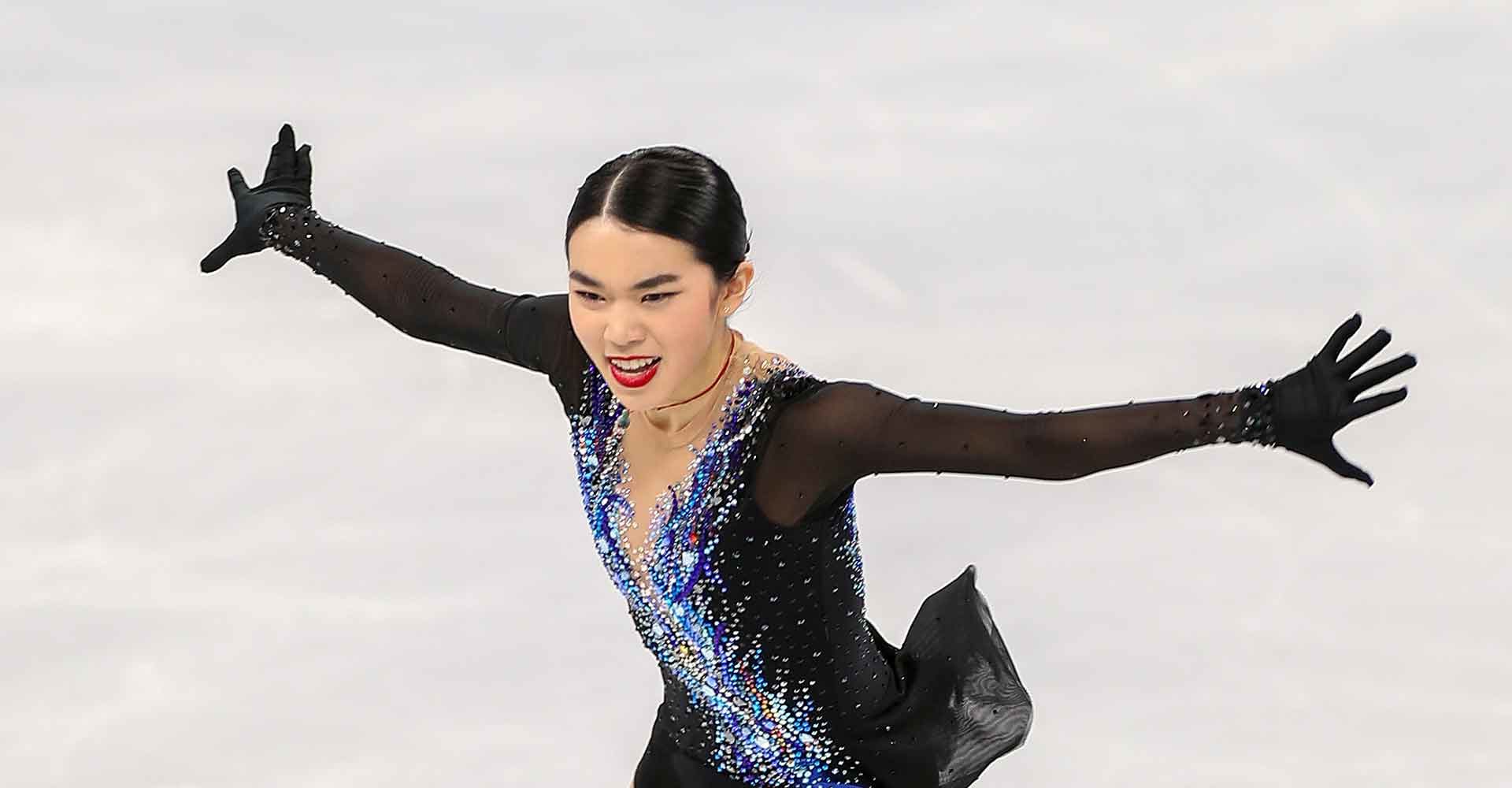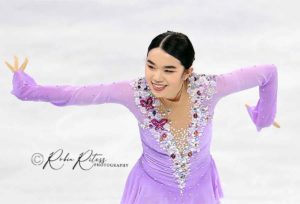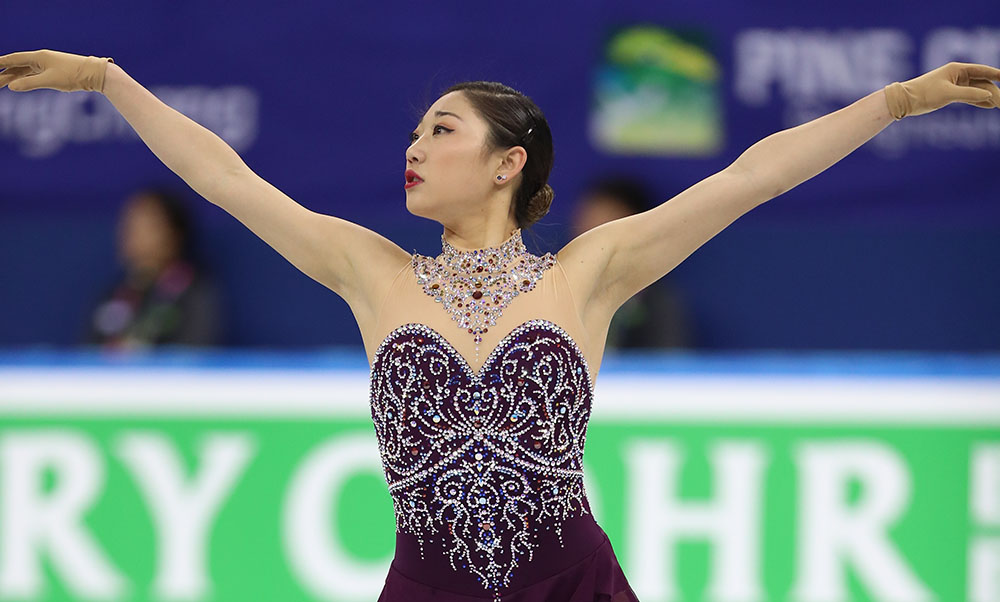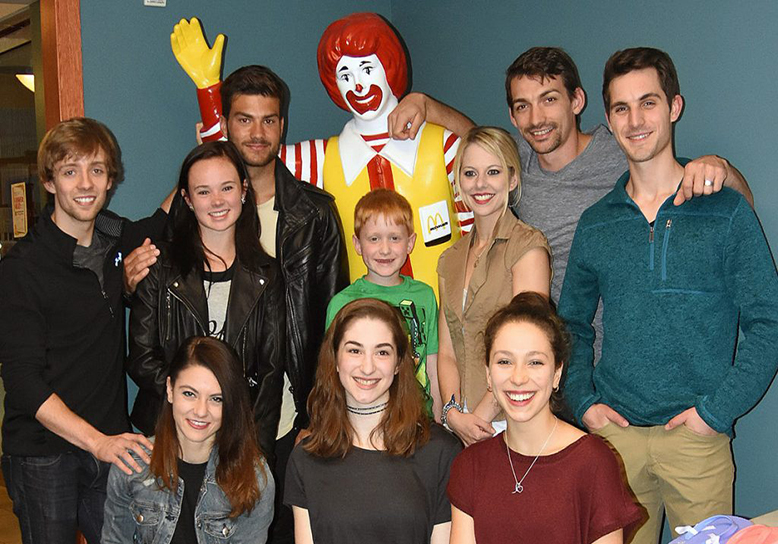By Maura Sullivan Hill, Team FSO staff writer
Photos by Robin Ritoss
Karen Chen is a two-time Olympian, Olympic Team Silver Medalist, and a U.S. National Champion, but even she isn’t immune to self-doubt.
“I work with my sports psychologist really closely, and I tell her, sometimes I go into my most difficult jumping pass or my most difficult element, and all I can think about is the times I wasn’t successful, and just a million thoughts going through my mind,” Chen said during a virtual talk about mental health on June 1, 2022. “So self-doubt is something that I’ve faced and that I’ve had to really try to overcome.”
Chen shared these and other thoughts on prioritizing mental health via Zoom during the talk, which was titled “Karen Chen on keeping calm under pressure” and offered by Connections Academy, the fully online public school where she earned her high school degree.
“In a way, I’m hoping that opening up about this can help somebody out there. Even if it is just one person, that would absolutely mean the world to me,” said Chen.
When self-doubt creeps in, Chen said, “What’s really helped me is to learn to just trust myself. It’s very hard, but you’ve got to just believe in yourself. Know that you’ve done all the work, you’ve done whatever it is you can — whether that’s studying for a test or getting ready for a competition. You’ve put in all the work and now you just gotta let it happen, and trust that everything’s going to turn out just fine.”
Prioritizing Her Mental Health
 During the 45-minute talk, which was open to the public and moderated by Connections Academy head of counseling Morgan Champion, Chen was candid about mental health struggles in figure skating in general and in her career specifically. She said she wished that she had prioritized her mental health sooner, but that with the athletic mindset comes a desire to push through challenges, rather than addressing them or getting help.
During the 45-minute talk, which was open to the public and moderated by Connections Academy head of counseling Morgan Champion, Chen was candid about mental health struggles in figure skating in general and in her career specifically. She said she wished that she had prioritized her mental health sooner, but that with the athletic mindset comes a desire to push through challenges, rather than addressing them or getting help.
“It’s hard for me to differentiate my skating accomplishments and my identity. I always get those two mixed together,” said Chen, who is also a student at Cornell University. “So when I don’t have the best skates, I feel like I let myself down. I feel like I let my family down. I feel like I let my coaches down. I feel like I failed as a student, I failed as an athlete, I failed as a daughter. And that’s something that I’m still working on — to learn to differentiate my self-worth and identity [from] my success as an athlete.
“Overall, I’m just so happy and thankful that I’ve been able to stay so dedicated in the sport and have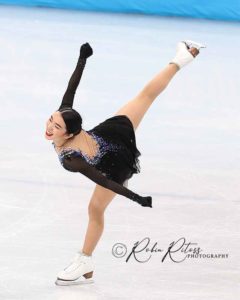 been able to have the support I need to face all these obstacles, especially the past two years leading up to the 2022 Olympic Games. I definitely really learned to prioritize my mental health and reach out to my support system, whether that be my friends and family or professional help. My sports psychologists and therapists, they’ve truly helped me gain that awareness and really helped me grow as a person and as a skater. And that’s kind of where I am today, I’m still on this journey. But I am just so proud of everything that I’ve accomplished and gone through, all the good and bad.”
been able to have the support I need to face all these obstacles, especially the past two years leading up to the 2022 Olympic Games. I definitely really learned to prioritize my mental health and reach out to my support system, whether that be my friends and family or professional help. My sports psychologists and therapists, they’ve truly helped me gain that awareness and really helped me grow as a person and as a skater. And that’s kind of where I am today, I’m still on this journey. But I am just so proud of everything that I’ve accomplished and gone through, all the good and bad.”
Chen also talked about how competing got more difficult as she got older and the nerves increased.
“I remember when I was younger, I would get so excited when there’s a competition. I got to put on my makeup, wear my dress and perform in front of my friends and family and obviously the judges,” she said. “But there came a moment where that kind of shifted. Perhaps I realized I had a shot at making the Olympics. I don’t know what it is exactly; it probably just has to do with me growing as a human and the thought processes have changed. So I definitely had to start to learn how to manage pressure and how to perform well under that. What really helped me is taking a step back and getting perspective, knowing that it’s just skating and it’s not going to be the end of the world if it doesn’t go the way I want it to.”
Connecting with Fellow Asian American Skaters
 The talk took place just after both Mental Health Awareness Month and Asian American Pacific Island Heritage Month in May. Chen shared that she has bonded with other Asian American skaters on Team USA because of their similar family experiences.
The talk took place just after both Mental Health Awareness Month and Asian American Pacific Island Heritage Month in May. Chen shared that she has bonded with other Asian American skaters on Team USA because of their similar family experiences.
“There’s so many Asian American figure skaters that have been so successful in the sport. The Olympic team, we had so many Asian American skaters, which is something that I really value,” Chen said. “And I find it really helpful. With my family, I’ve always struggled a little bit; I feel like if I don’t skate well, I let my family down. Mentally, it’s been a really big thing and a huge struggle of mine. So communicating that and reaching out to other Asian American figure skaters, and just to know that they’re also facing the same things, for me, made me feel connected and supported, to just know I’m not alone in this battle. And that’s helped me open up about it.”
How She Handles Stress and Anxiety
 Chen also shared specific tactics that she has used to manage stress and anxiety, including journaling, stretching, listening to music, bubble baths and the finger breathing technique, which she demonstrated on video for the audience.
Chen also shared specific tactics that she has used to manage stress and anxiety, including journaling, stretching, listening to music, bubble baths and the finger breathing technique, which she demonstrated on video for the audience.
“In certain situations, where I’m not in the comfort of my own home to do the self-care activities, I will take a second — let’s say I had a rough session and I know I have another skating session later in the day and I’m not feeling my best. I’ll make sure to take a second to do my breathing exercises. I really enjoy finger breathing, that my sports psychologist showed me, and you just take your hand and you trace up your finger and inhale and then exhale [and trace] all the way down. And I just feel like it really helps me stay grounded and in the moment.”
 At the 2022 U.S. Figure Skating Championships in Nashville, Chen also spoke about staying grounded and in the moment, despite nerves about qualifying for the Olympics and the stress of other athletes testing positive for COVID-19. When asked about that time during the Q&A portion of the talk, Chen said, “What really helped me was focusing on the things I can control.”
At the 2022 U.S. Figure Skating Championships in Nashville, Chen also spoke about staying grounded and in the moment, despite nerves about qualifying for the Olympics and the stress of other athletes testing positive for COVID-19. When asked about that time during the Q&A portion of the talk, Chen said, “What really helped me was focusing on the things I can control.”
Chen also made a distinction between usual pre-competition nerves and times where she was battling anxiety.
“In my head, I feel like all these little things, if I don’t do it, it’s going to affect how I skate,” said Chen, who shared that during bouts of anxiety she would go through her seven jumping passes seven times while warming up off ice, or question how she tied her skates before warmup. “It’s definitely something that I’ve learned to be more aware of, and in those moments when I have trouble making a decision, like if I should retie my skates, I tell myself — and my sports psychologist told me this — a decision is better than not making a decision. Whatever it is, just do it and then you’ve made that decision and you move on, because that’s going to be helpful.”
Comfortable in Her Own Skin
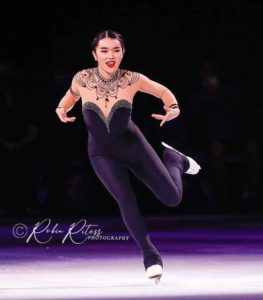 Throughout her talk, Chen emphasized that she is on a journey, both in managing mental health and in her life on and off the ice. This spring, that journey included a 24-city nationwide tour with Stars On Ice, and then she’ll head back to Cornell University’s Ithaca, New York, campus in the fall.
Throughout her talk, Chen emphasized that she is on a journey, both in managing mental health and in her life on and off the ice. This spring, that journey included a 24-city nationwide tour with Stars On Ice, and then she’ll head back to Cornell University’s Ithaca, New York, campus in the fall.
“Skating just happened to be the thing that gave me so many opportunities for me to face my fears and to overcome it. It’s a process; I didn’t go from a shy little girl to outgoing and an extrovert. It took time, and there was a learning curve to it,” Chen said. “Even this Zoom meeting, I would not have been able to do this five years ago. I would have been sweating so much right now, but I think experience has really helped me just to be more at ease and comfortable with my own skin.”


